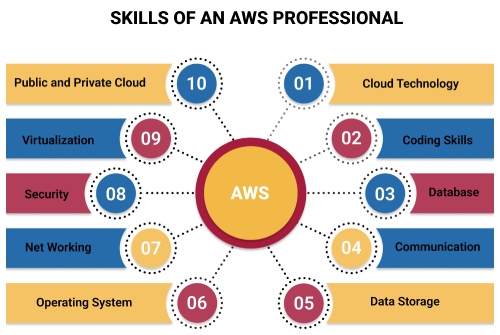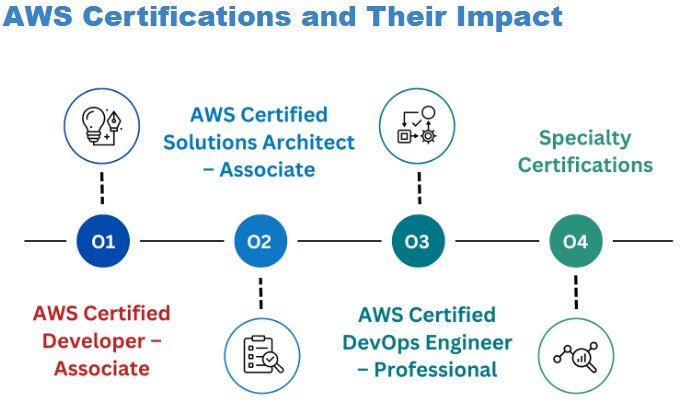
- Introduction to AWS Development
- Key Skills Required for an AWS Developer
- Understanding AWS Core Services
- Learning AWS SDKs and APIs for Development
- Working with Serverless Applications Using AWS Lambda
- Understanding DevOps and CI/CD in AWS Development
- Certifications for AWS Developers
- Security Best Practices for AWS Developers
- Building Scalable Applications with AWS
- Career Opportunities and Salary Trends for AWS Developers
- Tips for Succeeding as an AWS Developer
Introduction to AWS Development
AWS (Amazon Web Services) provides a comprehensive suite of cloud services that enable developers to build, deploy, and manage applications at scale. With cloud computing becoming a significant trend in the tech industry, learning AWS development has become an essential skill for modern developers. AWS offers computing power, storage, databases, machine learning, and networking services that help developers create flexible and scalable applications. As cloud adoption rises, mastering AWS development becomes a key differentiator for developers. This guide will explore the skills and services essential for AWS development, the career opportunities available, and tips to succeed as an AWS developer.
Key Skills Required for an AWS Developer
Becoming proficient in AWS development requires a strong understanding of several key areas. Here are some of the most critical skills needed for an AWS developer:
- Cloud Computing Fundamentals: To be successful as an AWS developer, you need a good grasp of cloud computing concepts, including services such as computing, storage, networking, and security. Understanding different cloud deployment models (IaaS, PaaS, SaaS) and public cloud architectures is vital.
- Programming languages: AWS developers typically work with programming languages like Python, Java, JavaScript, and Node.js. Mastery of one or more programming languages is crucial, as these languages are commonly used to interact with AWS services, and gaining this expertise is often supported through Amazon Web Services Training .
- Working with AWS Core Services: Understanding AWS core services like EC2 (Elastic Compute Cloud), S3 (Simple Storage Service), Lambda, RDS (Relational Database Service), and others is a must. You’ll use these services to manage infrastructure, handle data storage, and deploy scalable applications.
- Serverless Architectures: A deep understanding of serverless architectures using AWS Lambda and other related services (API Gateway, Step Functions, DynamoDB) is essential for modern application development. Serverless computing allows developers to focus on code rather than managing servers.
- DevOps and CI/CD: AWS developers need to understand DevOps practices and how to implement continuous integration and continuous deployment (CI/CD) pipelines using AWS services like CodePipeline, CodeBuild, and CodeDeploy. This enables fast and efficient delivery of application updates.
- Security Best Practices: Security is crucial when developing applications in the cloud. AWS developers should understand how to implement IAM (Identity and Access Management) roles and policies, encrypt data, secure APIs, and follow best practices for access control.
- Database Management: A solid understanding of AWS database services like RDS, DynamoDB, Aurora, and Redshift is essential for managing relational and NoSQL databases within cloud applications. This knowledge allows developers to architect efficient data storage and retrieval systems.
- Networking in AWS: AWS developers should be comfortable working with networking services such as VPC (Virtual Private Cloud), Route 53, and Direct Connect. These services help you build secure, isolated, and scalable cloud infrastructures.
- EC2 (Elastic Compute Cloud): EC2 allows you to launch and manage virtual servers (instances) in the cloud. It is one of the most fundamental services provided by AWS. Developers use EC2 to deploy applications and web servers, scale infrastructure, and run high-performance computing tasks.
- S3 (Simple Storage Service): AWS’s object storage service allows users to store and retrieve any amount of data at any time. It’s ideal for storing unstructured data such as images, backups, and log files. S3 is highly scalable and provides redundancy and availability.
- Lambda: AWS lambda is a serverless computing service that allows you to run code without provisioning or managing servers. You can upload your code, and Lambda will take care of the infrastructure, scaling, and event-driven triggers. Lambda is commonly used to build microservices and event-driven applications.
- RDS (Relational Database Service): RDS is a managed relational database service that supports MySQL, PostgreSQL, MariaDB, and Oracle databases. With minimal effort, RDS helps developers set up, operate, and scale relational databases in the cloud, making database management more straightforward and scalable.
- DynamoDB: DynamoDB is AWS’s NoSQL database offering that provides fast, predictable performance with seamless scalability. It is ideal for applications that need low-latency data access at any scale, such as gaming, IoT, and mobile applications.
- API Gateway: AWS API Gateway is a fully managed service that enables developers to create and publish RESTful APIs. It integrates with Lambda, allowing developers to build serverless applications where APIs trigger Lambda functions.
- SNS and SQS: SNS (Simple Notification Service) and SQS (Simple Queue Service) are AWS services that handle message-based communication. SNS is used for pub/sub messaging, and SQS for decoupled message queues. Both help build scalable and event-driven architectures.
- Event-driven architecture: Lambda functions are invoked in response to events, such as changes in data in S3, user actions, or HTTP requests through API Gateway.
- Statelessness: Each Lambda function is stateless, meaning it does not retain data between executions. For persistent storage, developers use databases such as DynamoDB or RDS.
- Scaling: Lambda automatically scales in response to incoming requests, ensuring your application can handle varying loads without manual intervention.
- Develop and deploy applications on AWS.
- Use core AWS services effectively.
- Implement and manage AWS-based applications.
- Use IAM Roles and Policies: AWS Identity and Access Management (IAM) is crucial for securing AWS resources. Developers should assign users the principle of least privilege, granting them only the permissions they need to perform their jobs.
- Use Multi-Factor Authentication (MFA): Enabling MFA on AWS accounts adds an extra layer of security, reducing the likelihood of unauthorized access.
- Encrypt Data: Always encrypt sensitive data in transit (e.g., using SSL/TLS) and at rest (e.g., using AWS KMS for encryption).
- Monitor with CloudTrail and CloudWatch: AWS CloudTrail records API calls and activities within AWS, while CloudWatch provides monitoring and logging capabilities. Developers can set up alerts to detect abnormal behavior and respond quickly to security threats.
- Building a serverless application with AWS Lambda and API Gateway.
- Deploying a web application using EC2 and RDS.
- Implementing a CI/CD pipeline using CodePipeline and CodeBuild.
- AWS Cloud Developer
- Cloud Solutions Architect
- DevOps Engineer
- AWS Software Engineer
Excited to Obtaining Your AWS Certificate? View The AWS Course Offered By ACTE Right Now!

Understanding AWS Core Services
Excited to Obtaining Your AWS Certificate? View The AWS Training Offered By ACTE Right Now!
Learning AWS SDKs and APIs for Development
The AWS SDK (Software Development Kit) is a collection of libraries that make it easier to interact with AWS services in various programming languages, such as Python (Boto3), Java, and JavaScript. Learning to use AWS SDKs enables developers to programmatically interact with AWS services, automate cloud tasks, and build scalable applications. AWS SDKs provide APIs for interacting with services like EC2, S3, Lambda, and RDS. It simplifies tasks such as uploading files to S3, creating EC2 instances, and managing Lambda functions by providing language-specific methods that remove the complexity of AWS’s raw API requests.
Working with Serverless Applications Using AWS Lambda
Serverless computing is a significant shift in how applications are built and deployed. AWS Lambda is critical in this shift, enabling developers to run code without provisioning or managing servers. Here’s how developers typically use Lambda:
Exploring Options for AWS Master’s Degree? Enroll For AWS Master Course Today!
Understanding DevOps and CI/CD in AWS Development
DevOps practices are essential for modern AWS development, and AWS provides various services to automate CI/CD pipelines for seamless testing, integration, and deployment. AWS CodePipeline automates the entire deployment workflow, from code commits in version control (e.g., GitHub) to deployment on AWS resources. AWS CodeBuild is a fully managed service that compiles source code, runs tests, and generates deployment-ready artifacts, integrating seamlessly with CodePipeline a key component often highlighted in AWS Training for CI/CD workflows. AWS CodeDeploy automates code deployments to EC2 instances and AWS Lambda, enabling zero-downtime deployments for smooth application updates.
Certifications for AWS Developers
Consider pursuing the AWS Certified Developer- Associate certification to enhance credibility and validate your skills. This certification demonstrates your ability to:
This certification is ideal for developers looking to prove their proficiency in building and managing applications using AWS.

Security Best Practices for AWS Developers
Security is a top priority when developing on AWS. Developers should always follow best practices to ensure that applications are secure and compliant, and pursuing Amazon Web Services Certification can help reinforce a strong understanding of these practices.
Preparing for AWS Job Interview? Check Out Our Blog on AWS Interview Questions & Answer
Building Scalable Applications with AWS
AWS offers developers powerful tools to build scalable and reliable applications by leveraging managed services that automatically adjust resources based on demand. Auto Scaling dynamically adjusts EC2 capacity to match workload requirements, ensuring optimal performance. Amazon Elastic Load Balancer (ELB) distributes incoming traffic across multiple instances, enhancing availability and fault tolerance. DynamoDB, a fully managed NoSQL database, provides fast and reliable data access, making it ideal for applications that require seamless scalability.
Hands-on Projects and Practical Learning Resources
To build hands-on experience with AWS, developers should engage in practical projects such as:
Additionally, AWS offers training and certification resources, including free courses on the basics of AWS and more advanced topics such as architecture and security.
Career Opportunities and Salary Trends for AWS Developers
AWS developers are in high demand as more organizations move to the cloud. Some standard job titles for AWS developers include:
Salaries for AWS developers can vary based on location, experience, AWS Training and role. On average, AWS developers earn a competitive salary, with top professionals commanding six-figure salaries
Tips for Succeeding as an AWS Developer
To stay ahead with AWS, stay updated on new services, tools, and best practices as AWS constantly evolves. Gain hands-on experience by building and deploying real-world projects to reinforce your learning. Get certified with credentials like the AWS-certified Developer Associate to enhance your credibility and job prospects, and explore AWS Certification Cost and Types to choose the right path for your goals. Engage with AWS communities by joining forums, attending AWS events, and participating in local meetups to connect with industry professionals and expand your knowledge.





